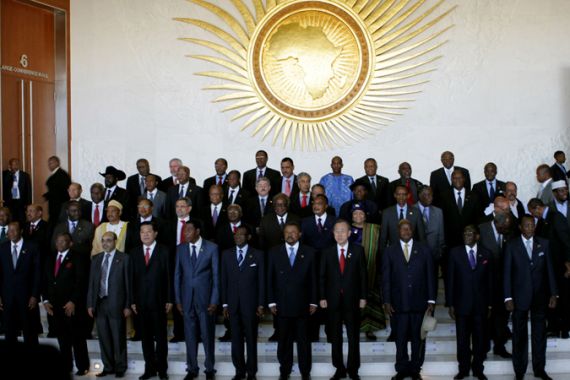AU extends mandate of top executive official
Term of Jean Ping prolonged after election in which he was challenged by Nkosazana Dlamini-Zuma was deadlocked.

The African Union has extended the mandate of its top official Jean Ping after an election, in which he was challenged by South Africa’s Nkosazana Dlamini-Zuma, deadlocked.
“We have decided to prolong the mandate of the current commission until the next summit in Lilongwe, Malawi” in June, bloc chairman, Benin’s President Thomas Boni Yayi, said on Tuesday at the end of a two-day summit in Addis Ababa.
Intense campaigns had preceded the vote for commission chief which dominated the AU summit in the Ethiopia capital, where leaders gathered to discuss broadening trade within Africa and tackling conflict hot spots.
Gabon’s Ping, 69, who has headed the African Union Commission since 2008, sought a new term but was unable to obtain the required two-thirds majority in a tight race with Dlamini-Zuma, ex-wife of South African President Jacob Zuma.
“We went for an election and none of the two candidates emerged as a winner,” Zambian President Michael Sata told reporters after the vote.
Pretoria said that Dlamini-Zuma will vie again for the post.
“Nothing stops us from fielding the same candidate because she has shown or proven to be a formidable candidate that the incumbent could not defeat,” South Africa’s International Relations Minister Maite Nkoane Mashabane said in a statement.
Political fault lines
Analysts say the vote for the AU agenda-setting position has exposed political fault lines between English- and French-speaking Africa, as well as between different geographic regions.
“The result has shown up divides in the continent,” Jakkie Cilliers, executive director of the Institute for Security Studies (ISS) in Pretoria, told AFP news agency at the summit. “South Africa worked hard to reduce Ping’s support base.”
But Boni Yayi insisted: “The continent is united and there is hope that it will continue to be united.”
Ping led Dlamini-Zuma in the first three rounds with 28 votes to 25, 27 to 26 and 29 to 24, AU sources said.
Dlamini-Zuma was then forced under AU rules to pull out, leaving Ping to face a fourth round on his own, but he still failed to muster the necessary votes.
Ahead of the vote, sources said Ping had been confident of re-election, counting on support from French-speaking West and Central Africa countries.
However, he has appeared to have fallen foul of criticism that he performed poorly in recent crises on the continent, after a year that saw a post-election conflict in Ivory Coast as well as the Arab Spring revolutions.
The AU was holding its first summit since the death of Libya’s Muammar Gaddafi, a key financier of the bloc, but who had allies mainly in French-speaking West Africa.
Dlamini-Zuma had launched a tough campaign and had the backing of the 15-member Southern African Development Community, as Pretoria lobbied hard across Africa to drum up support.
South African delegates broke into song and dance after the stalemate vote conducted at the summit in the new ultra-modern AU headquarters built by the Chinese and unveiled at the weekend.
But Cilliers warned that while Dlamini-Zuma supporters were celebrating, her failure to win suggested many might oppose South Africa for the post too.
“Importantly, this result may mean that Africans don’t want a key country such as South Africa in the position of chair,” he said.
No woman has held the post.
“It’s a good sign for gender politics in AU that a woman came so close for the vote to such a position,” said Cheryl Hendricks of the ISS thinktank.
On Sunday, the 54-member African Union elected Yayi as its new chairman, a rotating post held for one year.
Al Jazeera’s Nazanine Moshiri, reporting from the summit, said there was speculation that there had been negotiations between Dlamini-Zuma and Ping for one of them to stand aside.